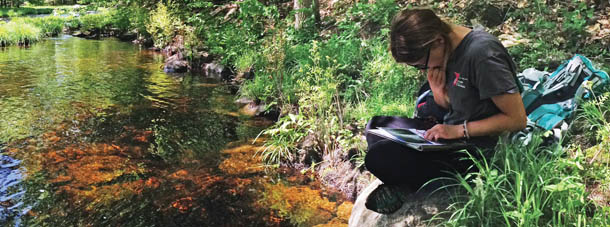
Combating endangered cod in Atlantic Canada
For many Canadians, lobster brings to mind visions of the Maritimes, but for Sarah Tasker the marine crustacean makes her think about cod.
Working towards her master’s degree with the School for Resource and Environmental Studies (SRES), Tasker’s research focuses on endangered cod and cusk in Canada’s largest Lobster Fishing Area, located in Southwest Nova Scotia.
“There are many unknowns concerning cod and cusk as bycatch in lobster fishing, and the issues of monitoring and data collection systems have created a fishery-wide management debate,” says Tasker. “My research highlights the importance of a bottom-up approach, including the fishers who have a deep understanding of the ecosystems and communities in which they fish.”
Collecting wide-ranging data and working with lobster fishers, fishery organizations, resource managers and conservationists, Tasker is filling knowledge gaps and using the data to present effective measures that are acceptable to the fishing community. She’s taking a holistic approach, looking at environmental, economic, social, political and market factors.
Costs of saving the cod
 While Tasker’s work is vitally important for a sustainable future, it comes with a cost. Research software, travel to meet with fishers, and sample collection are additional expenses on top of tuition, rent and food. Students like Tasker often require extra financial support to pursue this essential environmental research that benefits us all.
While Tasker’s work is vitally important for a sustainable future, it comes with a cost. Research software, travel to meet with fishers, and sample collection are additional expenses on top of tuition, rent and food. Students like Tasker often require extra financial support to pursue this essential environmental research that benefits us all.
“I have been lucky enough to follow my passion for sustainable fisheries management with the support of research funding from SRES. I’ve already learned so much through my work, in collaboration with the wonderful people that make up the lobster fishery in Nova Scotia.”
Supporting sustainable research
SRES is dedicated to supporting each of its master’s students and their research. And it is gifts to the Dalhousie Fund that make this financial aid possible. It provides the resources to help with expenses for field research, to attend conferences and for equipment. These funds enable students to better focus on their work, and reduce financial restraints.
“In a lot of cases, it may only take $500.00 to make a project viable,” says Peter Duinker, professor and acting director of the school. “That’s where the Dalhousie Fund comes into play, so that students can carry out important research without added financial challenges. Every little bit counts.”
 Please make a gift if you would like to support the important research of graduate students in SRES, like Sarah Tasker.
Please make a gift if you would like to support the important research of graduate students in SRES, like Sarah Tasker.